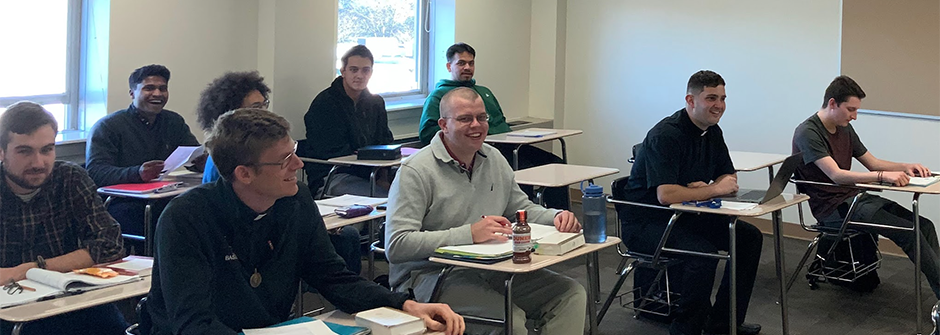
Intellectual Formation at St. Andrew's Hall
St. Andrew's College Seminary provides an excellent philosophical and theological education, incorporating academic endeavors into a broader vision of discipleship, understanding and growth in maturity.
All seminarians are Catholic Theology majors with a Philosophy Concentration at Seton Hall's Immaculate Conception Seminary School of Theology, a program designed specifically for college seminarians in preparation for priestly formation on the graduate level. As such, all seminarians experience the opportunity for solid growth, laying the foundation for achievement in theological endeavor at any major seminary. Some of the courses available to seminarians include:
Philosophy of Person
This course focuses on the basic issues of human reality and philosophical anthropology.
Topics that are covered in this course are the relation of body and soul, the relation
of self to society, the role of imagination and subconsciousness, and the meaning
of male and female.
New Life in Christ: Introduction to Roman Catholic Moral Theology
This course examines the basic themes in Roman Catholic moral theology in light of
the renewal of the discipline by the Second Vatican Council, The Catechism of the
Catholic Church, the legacy of teachings from St. John Paul II and the integrating
work of major Catholic theologians.
The Fathers of the Church
This course introduces students to the writers and theologians of the Church's first
seven centuries who laid the common foundations for Christianity's understanding of
God, Jesus Christ, the Church, the Bible and the essentials of Christian living.
History of Philosophy (I, II, III)
The History of Philosophy courses are divided into 3 sections taken over a period
of 3 semesters. History I covers the pre-Socratic philosophers up to St. Thomas Aquinas.
History II covers the themes on modern and contemporary philosophies such as the body-mind
problem and success of the natural sciences. History III covers the end of the 19th
century through the end of the 20th century and deals with topics such as phenomenology
and existentialism. These courses are designed so that the student may have insight
into how philosophy has evolved overtime, develop critical thinking habits, and discover
where ideas have been miscued and corrected.
In addition, all seminarians of St. Andrew's Hall are considered resident undergraduate students of Seton Hall University and can take advantage of a wealth of opportunity for open electives in an area of interest, or a possible second major or minor when one is up to the challenge of additional study.
